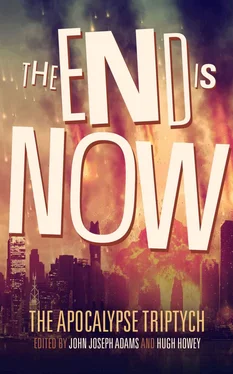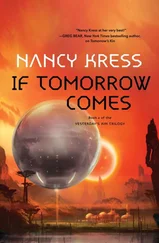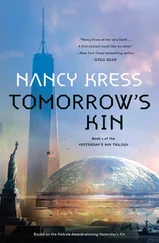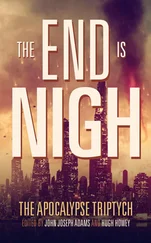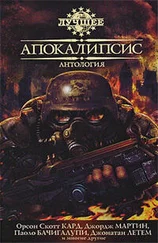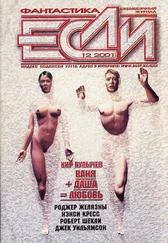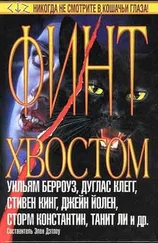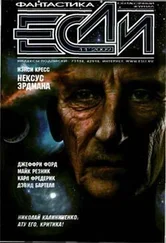“You’re lying to me.”
“I don’t know anything,” he repeated.
She lifted the wrench as if she would club him to death. He didn’t even know if he would resist if she tried.
But then, after a second, she lowered the wrench again.
Did she believe him? She didn’t say anything more.
The baby in her arm gurgled and reached for her hair with its tiny fist. A tiny fist with a tiny plus sign inked on the back.
“Your kid’s adorable,” Whitman said. Even to his own ears it sounded like he was trying to change the subject.
“He’s not mine,” Angie said, staring daggers at him.
“No?”
“Somebody left him in a car seat. They just left him sitting on the sidewalk in a car seat and they never came back. I was inside, in my place. Trying to hunker down. But this little guy,” she said, stroking the baby’s nose until it wriggled in joy, “was right outside and kept crying. What else was I supposed to do? I went outside,” she said, “thinking I would just bring him in. That was when I saw Mr. Tydall from next door, limping up the sidewalk. Covered in bite marks. I knew I had to help as many people as I could. That it was going to be a long time before the government came to save us.”
Whitman studied the bullet holes in the radiator. He knew nothing about cars or engines or anything.
“Those soldiers were willing to shoot us all,” Angie said. “They were willing to shoot this baby rather than let us get away. You knew that.”
“I don’t know—”
“You knew. ”
She dropped the wrench, and it clattered on the concrete floor. Several of the others looked up at the commotion. Some craned their heads around the side of the truck to see what had happened. How many of them were listening?
He couldn’t tell Angie everything. But she deserved at least a hint of the truth.
Even so, it was hard to start. “How did you get that?” he asked, pointing at the plus sign inked on the back of Angie’s hand.
“That’s not important.”
“Please. It is. One of the guys in the truck, one of the people you brought with you—he said you ran one of the local hospitals.”
“Hardly,” Angie said. She bounced the baby on her hip. “I’m a nurse. An RN.” She shook her head. “Fine. It was about a week ago. A guy from the CDC came through and interviewed all of us. He asked who among us had been exposed to zombies. Well, that was hilarious, right? We’ve been dealing with this epidemic for nearly six months now. You find me one nurse or doctor or orderly or x-ray technician even who hasn’t been bitten or spat on or bled on by a zombie. You find me even one and I’ll be surprised. So this guy from the CDC, he went down the line and stamped each of us. He didn’t even explain what it meant, though we could pretty much guess. It means we’re positives. Possibly positive.” She actually smiled a little. “What a bunch of horseshit, right? There’s no way this thing is that aggressive. No way we’re all infected.”
“No,” Whitman agreed. “It’s not likely. But this thing—this disease. There’s a major problem with it. It’s asymptomatic.”
One of the men leaning around the side of the truck cleared his throat. “What does that mean?” he asked.
“It means,” Whitman said, picking his words carefully, “when somebody turns into a zombie there’s no warning. It just happens. You can’t predict who’ll it happen to, or when.” He threw up his hands. “There’s no way to diagnose it, no test. Nothing anyone can do to say this person is infected and dangerous and that person is clear.”
“So the plus signs . . .” Angie prompted.
“You’re a nurse. You know about reverse triage.”
Angie’s face went blank. All expression just drained away, all at once.
She got it.
“I don’t know about it,” somebody said. The mechanic. “What the hell is that?”
“Normally at a hospital,” Angie said, “we do triage. In the emergency room. We figure out who’s about to die if we don’t help them first. Then we make everybody else wait, all the people who just have bad headaches or they’ve got the flu, or whatever. We focus our resources on the people who need them the most.”
“And reverse triage?” the guy asked.
Angie looked down at the baby. “That’s for when things get bad. I mean, monumentally bad. That’s when you look at the people who are about to die and you . . . you just let them go. You use your resources to help the people who have the best chance of making it. The people with the least threatening injuries. And everybody else can just . . . they . . . you try not to think about them.”
For a while she was silent. Whitman could see, from her face, that she was putting the pieces together. Figuring out just how bad things had become.
“Guilty until proven innocent, huh?” she said. She held up her left hand to show him her plus sign. “Infected until I can prove I’m healthy.” She leaned down and kissed the baby’s head. Then she did it again, and Whitman knew she was trying to hide her face from the others. So they wouldn’t see.
If you had a plus sign on your hand, the government was convinced you were a risk. That meant you had no rights. It meant they could tell you where to go, and how long you had to stay there, and there was nothing you could do about it.
“I saw that ID you have around your neck. And the logo on the truck. You work for the CDC, don’t you?” she asked.
He didn’t deny it.
“You were around zombies this whole time, too. You got bitten, or spat on, or bled on too.”
He looked down at his own hand. His right hand—the one that wasn’t inked. There was a mark there all the same, a red imprint in the shape of human teeth, in the soft flesh between his thumb and index finger. “It happened a long time ago. The very first zombie I ever saw, actually. I didn’t think she broke the skin. But my boss decided not to take any chances.”
Angie took a long, difficult breath. “What happens to people like us? Potential positives?”
“They go to Staten Island,” he told her.
* * *
Earlier, back when he was still in charge of something, Whitman had seen what Staten Island had become. They’d flown him over the island in a helicopter. One corporal had even given him a pair of binoculars so he could get a closer look.
Depending on how you counted, there were eight million people in New York City’s five boroughs, or nearly twenty million in the surrounding region. By a rough estimate, maybe twenty percent were potential positives—four million people with plus signs on their hands. Four million people who could turn into zombies without any warning, without any symptoms, at any time.
It was folly to think that the evacuation could run smoothly. That the safety of all those people could be guaranteed. And of course, it didn’t work out the way anyone had hoped.
Ferry boats ran nonstop, moving potential positives over to Staten Island. Dumping their human cargo at gunpoint, then turning around and steaming back for Manhattan or Brooklyn or across the harbor to New Jersey to pickup more. On the shore the evacuees stood in teeming crowds, unsure of what to do—many didn’t speak English, many more refused to follow the instructions bellowed at them by loudspeakers, if they could even hear those orders over the noise of all the helicopters.
It would have been chaos and riots and panic even without the zombies. But these people were potential positives. They had a chance of having contracted the prion disease. Many of them, just by sheer probability, had. And if you extrapolated on those probabilities, if you ran the equation for how many of those people were going to go symptomatic on this night of all nights—
Читать дальше
